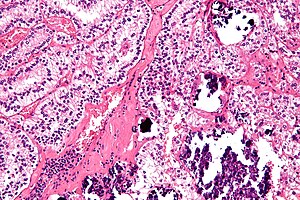TFE3-rearranged renal cell carcinoma
Jump to navigation
Jump to search
Renal tumour with Xp11.2 translocation, also Xp11.2 translocation carcinoma and Xp11 translocation renal cell carcinoma, is an uncommon malignant kidney tumour in the MiT family translocation renal cell carcinoma.
| TFE3-rearranged renal cell carcinoma | |
|---|---|
| Diagnosis in short | |
 Xp11.2 translocation carcinoma. H&E stain. | |
|
| |
| Synonyms | Xp11 translocation renal cell carcinoma, renal tumour with Xp11 translocation |
|
| |
| LM | large cells with clear or eosinophilic cytoplasm, calcification (classic histomorphologic feature), +/-papillae, +/-nests, +/-psammoma bodies (common), +/-hyaline bodies (common) |
| LM DDx | clear cell renal cell carcinoma, papillary renal cell carcinoma, epithelioid angiomyolipoma, clear cell papillary renal cell carcinoma, unclassified renal cell carcinoma |
| IHC | TFE3 +ve (nucleus), CD10 +ve, vimentin +ve, CK7 -ve (usu.) |
| Molecular | translocation involving TFE3, e.g. t(X;1)(p11.2;q21) |
| Grossing notes | total nephrectomy for tumour grossing, partial nephrectomy grossing |
| Site | kidney - see kidney tumours |
|
| |
| Clinical history | children or younger adults |
| Prevalence | rare |
| Prognosis | poor |
| Clin. DDx | other kidney tumours |
It should not be confused with renal tumour with t(6;11) translocation (also known as TFEB RCC), another translocation carcinoma found in the kidney that is also in the MiT family translocation renal cell carcinoma.
General
- Defined by the presence of a fusion gene formed with TFE3 @ Xp11.2.
- TFE3 is the gene involved in the translocation seen in alveolar soft part sarcoma (ASPS).
- Poor prognosis - majority Stage III or Stage IV.[1]
- ~1/3 of childhood RCC.[2]
Microscopic
Features:[3]
- Large cells.
- Clear or eosinophilic cytoplasm.
- Papillae or nests.
- Psammoma bodies - common.[4]
- Calcification is considered the classic histomorphologic feature.
- Hyaline bodies - common.
Notes:
- Looks clear cell RCC or papillary RCC or a hybrid between the two.
- May resemble alveolar soft part sarcoma.
DDx:
- Clear cell RCC.
- Papillary RCC.
- Epithelioid angiomyolipoma.
- Clear cell papillary renal cell carcinoma.
- Renal cell carcinoma, unclassified.
Images
Case 1
Case 2
www
IHC
Others:
- CD10 +ve.
- Vimentin +ve.
- CK7 -ve.
- Positive in ~20% of cases.[7]
- HMB-45 & Melan A -ve.
- Positive in epithelioid angiomyolipoma.
- EMA usually -ve.[8]
- CD117 -ve (0 +ve/21 cases[8]).
- CK (pooled) -ve.[8] (???)
- WT1 -ve (0 +ve/21 cases[8]).
Notes:
- Poor man's panel - if one doesn't have the more informative stains:
- CK (pooled), EMA, Melan A, HMB-45, CK7, AMACR, CD10, vimentin.
Molecular
- Translocation involving TFE3.[3]
The most common are:[9]
- t(x;1)(p11.2;q21) PRCC-TFE3.
- t(x;17)(p11.2;q25) ASPSCR1-TFE3.
- Also seen in alveolar soft part sarcoma.
See also
References
- ↑ Su, HH.; Sung, MT.; Chiang, PH.; Cheng, YT.; Chen, YT. (Aug 2014). "The preliminary experiences of translocation renal cell carcinoma and literature review.". Kaohsiung J Med Sci 30 (8): 402-8. doi:10.1016/j.kjms.2014.03.003. PMID 25002378.
- ↑ Argani, P.; Olgac, S.; Tickoo, SK.; Goldfischer, M.; Moch, H.; Chan, DY.; Eble, JN.; Bonsib, SM. et al. (Aug 2007). "Xp11 translocation renal cell carcinoma in adults: expanded clinical, pathologic, and genetic spectrum.". Am J Surg Pathol 31 (8): 1149-60. doi:10.1097/PAS.0b013e318031ffff. PMID 17667536.
- ↑ 3.0 3.1 3.2 Humphrey, Peter A; Dehner, Louis P; Pfeifer, John D (2008). The Washington Manual of Surgical Pathology (1st ed.). Lippincott Williams & Wilkins. pp. 285. ISBN 978-0781765275.
- ↑ Prasad, SR.; Humphrey, PA.; Catena, JR.; Narra, VR.; Srigley, JR.; Cortez, AD.; Dalrymple, NC.; Chintapalli, KN.. "Common and uncommon histologic subtypes of renal cell carcinoma: imaging spectrum with pathologic correlation.". Radiographics 26 (6): 1795-806; discussion 1806-10. doi:10.1148/rg.266065010. PMID 17102051.
- ↑ Amin MB, Epstein JI, Ulbright TM, et al. (August 2014). "Best practices recommendations in the application of immunohistochemistry in urologic pathology: report from the international society of urological pathology consensus conference". Am. J. Surg. Pathol. 38 (8): 1017–22. doi:10.1097/PAS.0000000000000254. PMID 25025364.
- ↑ Martignoni G, Gobbo S, Camparo P, et al. (October 2011). "Differential expression of cathepsin K in neoplasms harboring TFE3 gene fusions". Mod. Pathol. 24 (10): 1313–9. doi:10.1038/modpathol.2011.93. PMID 21602817.
- ↑ He, H.; Zhou, GX.; Zhou, M.; Chen, L. (Sep 2011). "The distinction of clear cell carcinoma of the female genital tract, clear cell renal cell carcinoma, and translocation-associated renal cell carcinoma: an immunohistochemical study using tissue microarray.". Int J Gynecol Pathol 30 (5): 425-30. doi:10.1097/PGP.0b013e318214dd4f. PMID 21804394.
- ↑ 8.0 8.1 8.2 8.3 Argani, P.; Hicks, J.; De Marzo, AM.; Albadine, R.; Illei, PB.; Ladanyi, M.; Reuter, VE.; Netto, GJ. (Sep 2010). "Xp11 translocation renal cell carcinoma (RCC): extended immunohistochemical profile emphasizing novel RCC markers.". Am J Surg Pathol 34 (9): 1295-303. doi:10.1097/PAS.0b013e3181e8ce5b. PMID 20679884.
- ↑ Ellis, CL.; Eble, JN.; Subhawong, AP.; Martignoni, G.; Zhong, M.; Ladanyi, M.; Epstein, JI.; Netto, GJ. et al. (Dec 2013). "Clinical heterogeneity of Xp11 translocation renal cell carcinoma: impact of fusion subtype, age, and stage.". Mod Pathol. doi:10.1038/modpathol.2013.208. PMID 24309327.